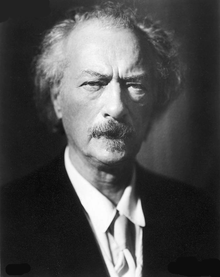Ignacy Jan Paderewski | |
|---|---|
 Paderewski circa 1935 | |
| 3rd Prime Minister of Poland 2nd Prime Minister of the Republic of Poland | |
| In office 18 January 1919 – 27 November 1919 | |
| President | Józef Piłsudski (Chief of State) |
| Preceded by | Jędrzej Moraczewski |
| Succeeded by | Leopold Skulski |
| Minister of Foreign Affairs | |
| In office 16 January 1919 – 9 December 1919 | |
| Prime Minister | Himself Leopold Skulski |
| Preceded by | Leon Wasilewski |
| Succeeded by | Władysław Wróblewski |
| Chief of the National Council of Poland | |
| In office 9 December 1939 – 29 June 1941 | |
| Personal details | |
| Born | 6 November 1860 Kuryłówka, Podolia |
| Died | 29 June 1941 (aged 80) New York City, U.S. |
| Profession | pianist, composer, politician, diplomat |
| Signature | |
Ignacy Jan Paderewski (Polish: [iɡˈnatsɨ ˈjan padɛˈrɛfskʲi]; 18 November [O.S. 6 November] 1860 – 29 June 1941) was a Polish pianist and composer, freemason,[1] politician, statesman and spokesman for Polish independence.[2] A favorite of concert audiences around the world, his musical fame opened access to diplomacy and the media.
Paderewski met with President Woodrow Wilson, and advocated an independent Poland, which became point 13 among Wilson's Fourteen Points at the Paris Peace Conference in 1919, which led to the Treaty of Versailles, which Paderewski signed on Poland's behalf.[3] In 1919, Paderewski was during 10 months the Prime Minister of Poland and also slightly longer Poland's foreign minister. Soon thereafter he left Poland, never to return, although he resumed his worldwide music career.[4]
Piano Concerto in A Minor, Op 17
1. Allegro
2. Romanza. Andante
3. Finale. Allegro molto vivace
Felicja Blumental, piano
Vienna Symphony Orchestra
Helmut Froschauer, conductor
1. Allegro
2. Romanza: Andante 17:25
3. Allegro molto vivace 27:15
Zelman Memorial Symphony Orchestra (ZMSO, Melbourne)
conducted by Mark Shiell
Konrad Olszewski - piano
13th National Polish Arts Festival - PolArt2015